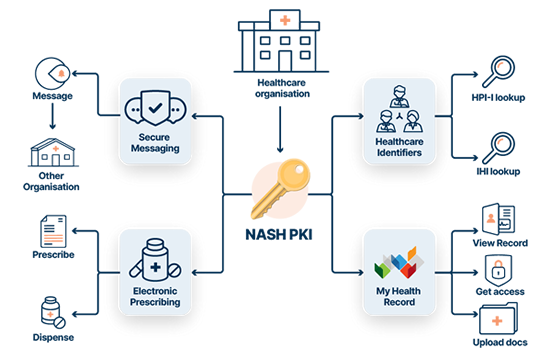Digital health updates for 2022
Through the National Allergy Strategy – Australian Digital Health Agency (My Health Record) Project, we are staying abreast of digital health activities so we can keep you informed about issues that are most relevant to your private practice. We also continue to advocate for the availability of accurate, meaningful and accessible allergy information available through My Health Record.
As part of our agenda this year, we will:
- Explore and provide recommendations on how to standardise and optimise the way allergy information is entered and communicated in electronic health records, including My Health Record.
- Work with the Australian Digital Health Agency terminology team to standardise the allergy terminology used in electronic health records.
- Prepare more how-to guides and webinars, as new software enhancements are released, about how to engage with My Health Record, developed specifically for ASCIA members.
- Engage with the Aged Care Connection and Use Project to ensure accurate and meaningful allergy information is transferred between the health system and aged care.
In this newsletter we provide you with an insight into what’s happening in digital health in 2022.
Access to information from the Australian Immunisation Register
You can access your patient’s immunisation history, including information from the Australian Immunisation Register, through My Health Record. There is no need to log in to PRODA, and there are no timed logouts. Step-by-step instructions are available to access My Health Record through Genie or Medical Director as well as through the National Provider Portal.
For more information, see https://www.myhealthrecord.gov.au/for-healthcare-professionals/howtos/immunisation-view
Act now to renew your NASH PKI to maintain access to electronic prescriptions and My Health Record
National Authentication Service for Health (NASH) Public Key Infrastructure (PKI) certificates expire in March 2022 for many organisations. To maintain access to important digital tools such as electronic prescribing and My Health Record, your organisation needs to ensure that your NASH PKI certificate is renewed.
To complete this process, please view this short NASH PKI renewal animation which includes simple step-by-step instructions with screenshots in PRODA and HPOS. The video is a quick and useful way to help the Organisation Maintenance Officer (OMO) for your organisation understand the steps involved.
The Australian Digital Health Agency has developed additional resources to support you during the renewal process:
Webinars – Attend a webinar and be guided through the renewal process. Register here.
Guides – Follow the step-by-step instructions in PDF format to renew a NASH PKI certificate.
FAQs – Take a look at the frequently asked questions on NASH PKI certificate renewal.
Visit www.digitalhealth.gov.au/nash for more information and resources.

Electronic prescriptions are taking off
Electronic prescribing provides an option for patients to choose to receive their prescription via an app, SMS or email in the form of a link to a unique QR code or “token”. The token is scanned by the pharmacy to unlock the electronic form of the prescription. More than 37 million electronic prescriptions have been issued since May 2020, by more than 31,000 prescribers.
To generate an electronic prescription, you will need the capability built into your clinical information system. Contact your software provider directly to get more information or view the electronic prescribing conformance register. For more information or to complete an online training module for CPD points, click on the Training and resources tab on the right hand side of the Electronic prescribing for prescribers website.
Do you work in a hospital?
My Health Record can be a valuable decision support tool for hospital staff. Having access to health information contained in My Health Record can reduce the instance of adverse medication events (including hospital re-admissions), decrease the duplication of diagnostic tests, and improve continuity of care for patients across the primary and secondary care sectors. Visit: My Health Record for Hospital staff online training course.
National Allergy Strategy digital health resources
The National Allergy Strategy website hosts a collection of resources for ASCIA members interested in learning more about My Health Record. To view all resources for health professionals, visit the page for the Australian Digital Health Agency Project page.
For more information about this project, please contact Heather Roberts, Senior Project Officer, National Allergy Strategy:
Kind regards,
Dr William Smith and Ms Karen Wong
Project Co-leads, National Allergy Strategy Australian Digital Health Agency (My Health Record) Project
The National Allergy Strategy is a partnership between the Australasian Society of Clinical Immunology and Allergy (ASCIA) and Allergy & Anaphylaxis Australia (A&AA) in collaboration with other stakeholders.
The National Allergy Strategy is working with the Australian Digital Health Agency to improve the quality of patient allergy information in My Health Record. More information is available at https://nationalallergystrategy.org.au/projects/australian-digital-health-agency.

